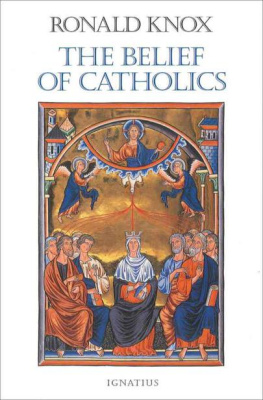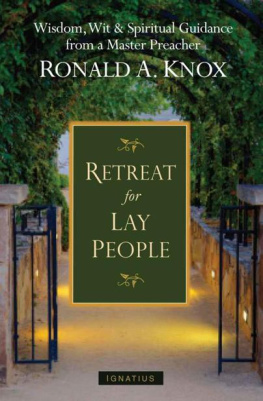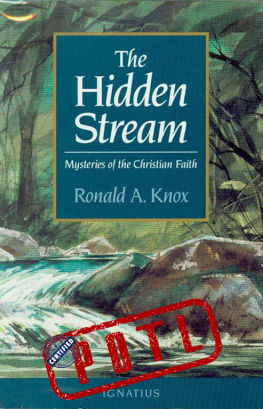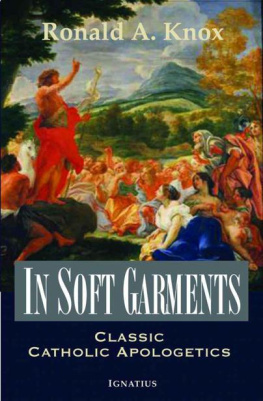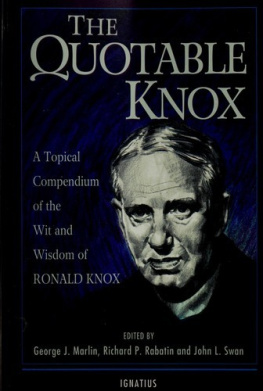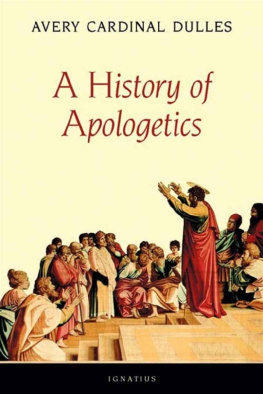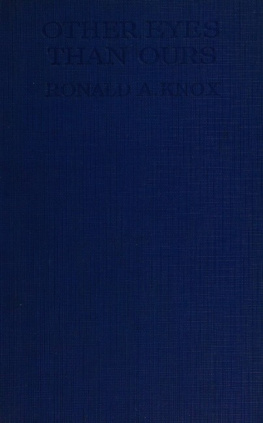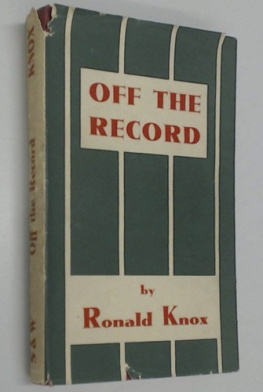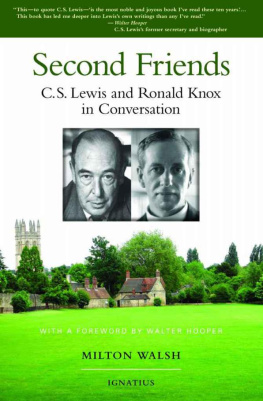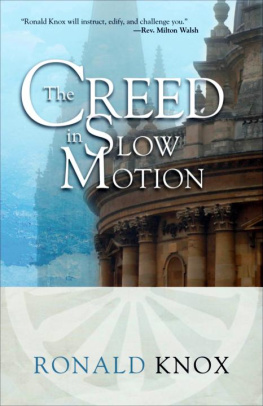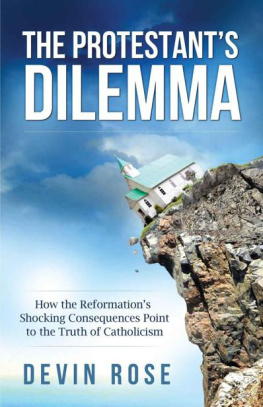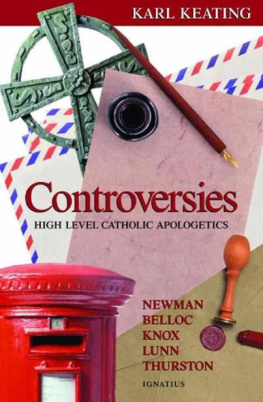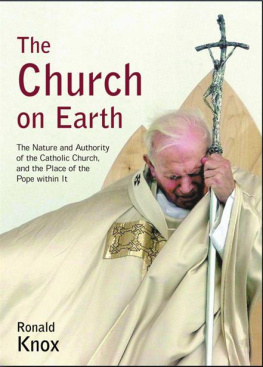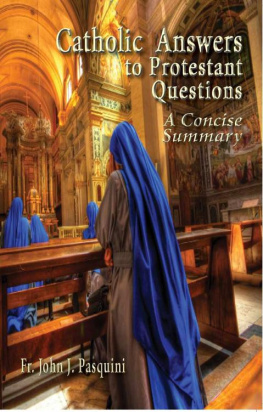THE BELIEF OF CATHOLICS
RONALD KNOX
THE BELIEF
OF
CATHOLICS
IGNATIUS PRESS SAN FRANCISCO
Originally published by Sheed and Ward
1927 by Ronald Knox
Copyright by the Earl of Oxford and Asquith
Published with ecclesiastical approval, 1927
Doubleday Image Book edition 1958
Reprinted with permission
Cover art: Pentecost
Psalter of Ingebourg of Denmark
Muse Conde, Chantilly, France
Giraudon / Art Resource, New York
Cover design by Roxanne Mei Lum
Published by Ignatius Press, San Francisco, 2000
ISBN 978-0-89870-586-7
Library of Congress control number 96-83634
Printed in the United States of America
CONTENTS
FOREWORD TO THE
PRESENT EDITION
Of the British convert-writers who flourished in the first half of the twentieth century, few have been more influential than Ronald Knox (1888-1957). The son of the Anglican bishop of Manchester, he was called the cleverest boy ever to pass through Eton, and he excelled at Oxford, where he became known for his wit and classical scholarshipas early as his teenage years he was writing fine Latin and Greek verse. He was elected president of the Oxford Union and the debating society, and countless satirical verses and limericks were ascribed to him.
Knox religious views matured early on. By the time he was sixteen he had subscribed to the Anglo-Catholic position, a considerable contrast from his fathers Low Church position, and before his 1917 conversion to Catholicism he composed two brilliant works to support his views, Absolute and Abitofhell (1913), a satire modeled on Drydens poem, and Reunion All Around , a look at ill-conceived attempts at religious unity, which even today sheds light on certain excesses of the ecumenical movement.
In 1918 appeared the story of Knox conversion, A Spiritual Aeneid . A year later he was ordained a Catholic priest. For the next eight years he taught at St. Edmunds College in Ware and then was appointed chaplain to the undergraduates at his beloved Oxford, a post he held until 1939. While there he issued a seemingly endless stream of books, including collections of sermons, retreats, and even detective stories. (In his biography of Knox, Evelyn Waugh tweakingly noted that the detective stories, written in a logical style popular in the nineteen-twenties, had little appeal for women.)
Of special note is Knox apologetical correspondence with Arnold Lunn, Difficulties (1932). He and Lunn were exact contemporaries, though Knox was a year ahead of Lunn at Oxford. Each in turn was the editor of the undergraduate journal The Isis . As Knox moved ever more Coward Catholicism, Lunn moved toward a studied agnosticism. In their early forties they agreed to an exchange of letters in which Lunn presented his objections to the faith and Knox answered him. There was no effort by Knox to browbeat Lunn into submission. In fact, Lunn later attested that it was Knox reserve that won him over. Winsome arguments in the end proved winning, and Lunn went on to become not only a convert but a noted Catholic apologist in his own right.
At the end of his Oxford chaplaincy, Knox wrote what is in artistry the best of his books, Let Dons Delight . Little read today, it is a series of conversations held in an imaginary Oxford common room at fifty-year intervals from the time of Elizabeth I to 1938. Especially remarkable is the manner in which Knox, through the conversation of his characters, conveyed subtle changes in the English language. He was a master not only of the English of our time but of the English of the preceding five centuries. Let Dons Delight is a telling look at how the British slowly fell away from authentic Christianity and clear thinking on religion once they severed their connection to Rome.
When Knox resigned the chaplaincy, it was with the intention of devoting himself to a fresh translation of the Bible. Brought up with the literary excellence of the Authorized Version and recognizing the deficiencies of the Douay-Rheims translation, he thought a new translation, in what he termed timeless English, was needed if modern Catholics were to turn to the Bible in numbers. Obtaining the encouragement of the bishops of England and Wales, Knox moved to Aldenham in Shropshire, only to discover himself chaplain again, this time to girls whose school had been moved there at the outbreak of the war. Some of his best-received books The Creed in Slow Motion, The Mass in Slow Motion , and The Gospel in Slow Motion came from lectures delivered to them. His new duties delayed his work on the Bible, which was not completed until 1949. Many consider his version, which was a translation from the Vulgate, to be still the best available for devotional reading.
By his own reckoning, Knoxs magnum opus was Enthusiasm (1950). He worked on it, off and on, for thirty years. He long had been interested in the phenomenon of religious enthusiasm, which is the claim of some people that they have a private revelation of Gods will. Being above all a man of the Church, Knox was deeply convinced of her necessity and authority; he was suspicious of those claiming private revelations and found that they usually caused considerable harm. He hoped to demonstrate from history the chaos that results when one rejects the authority of Rome. All my historical figures, Wesley himself included, were to be a kind of rogues gallery, an awful warning against illuminism. But somehow, in the writing, my whole treatment of the subject became different; the more you got to know the men, the more human did they become, for better or worse; you were more concerned to find out why they thought as they did than to prove them wrong. Knox looked at movements both outside and inside the Churchfrom Methodism to Quietism, from Quakerism to Jansenismand his analysis is especially useful today, when enthusiastic movements within Christianity are more widespread than ever.
His last apologetic work is his least known because it never was completed. Proving God: A New Apologetic was brought out posthumously in 1959, first in The Month and then as a long booklet. Waugh described it as a work of systematic apologetics written in the language of the modern mind. This is not to say that the unfinished work represented Knox first attempt to convey the faith colloquially. Each of his earlier apologetical writings was composed with this goal in mind. But by the end of his life he had come to see that things had altered so rapidly that each generation required its own approach. Proving God presents the same material in two formsKnox was undecided about which to usein straight prose and in the guise of a conversation. Knox was acutely conscious of the need for a well-rounded apologetic and was trying to find the right format for the middle of the century. He argued that mere argument was not enough. Beat the atheist in argument, force him by sheer reason to admit the existence of a Deity, without at the same time convincing him of his need for redemption, and you have done him an injury. You have robbed him of his last poor thread of excusethat he sinned in ignorance. Argument may be effective in breaking down excuses non-Catholics provide themselves, but it must go beyond that and lead to answers to lifes deepest yearningsand fears. Had it been completed, Proving God might have ended up as Knox premier piece of apologetics. That honor must go, instead, to a much earlier work, The Belief of Catholics (1927), perhaps his best-known book.
While it deals extensively with Protestantism (one chapter is tided, plainspokenly, Where Protestantism Goes Wrong), its target is more the unchurched or lightly-churched modern who, if he gives any thought at all to Catholicism, thinks it mildly foreign. Knox begins traditionally, with a discussion of the God who hides himself, and it is only halfway through that the divinity of Christ is established. As Knox knew, it is not the most difficult part of modern apologetics to convince the devoted Protestant that he has much of Christian truth but now needs to move on to the rest, which is found only in the Catholic Church, The most difficult part is convincing the nominal Protestant (or nominal Catholic, for that matter) or the vaguely religious person or the person without any religious inclinations that God really does exist, that his existence matters, and that only knowledge of him and obedience to him can lead to answers to the questions that haunt everyone.
Next page
